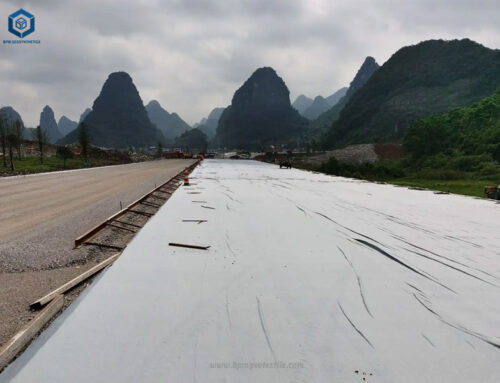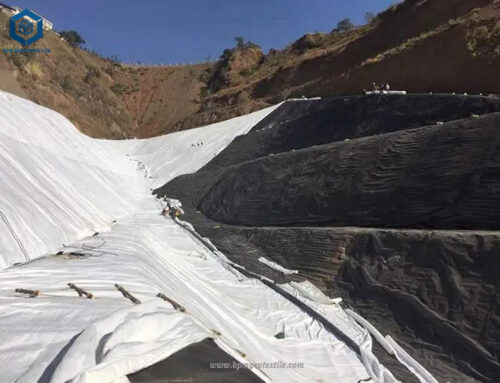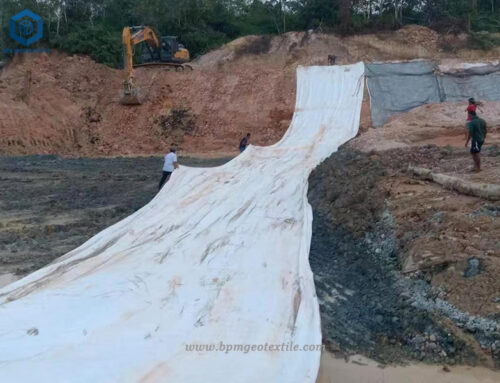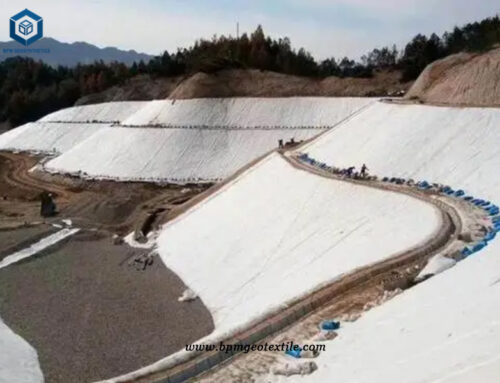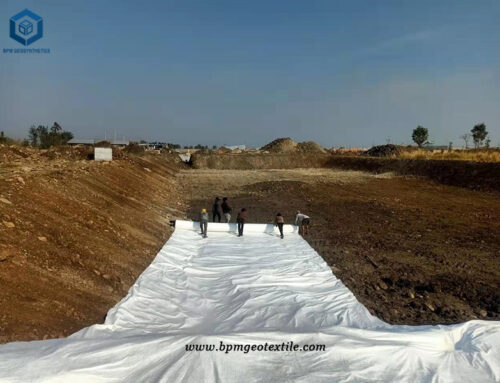Non woven polyester fabric, also known as non woven geotextile fabric, are permeable geosynthetic materials made of synthetic fibers by needled punched or woven method. Nonwoven polyester fabric is a cost-effective textile that is commonly used in the production of disposable products, such as medical and hygiene items, as well as industrial air filters, thanks to its lightweight nature. Its versatile use extends to various applications, including protective clothing, construction materials, apparel and shoe interlinings, agricultural fabrics, acoustic panels, and more. The fabric’s affordability and adaptability make it a preferred choice in industries where cost-effectiveness and functionality are essential.
1. What is Non Woven Polyester Fabric?
Non woven polyester fabric is a type of fabric that is made from 100% polyester filament or a blend of polyester fibers. It is widely used in various applications due to its versatility and desirable properties.
In industrial settings, non woven polyester fabric is commonly used as filter material for applications such as air filtration. It is also utilized in the production of medical and hygiene products, where its lightweight and non-irritating properties make it suitable for items like surgical masks and gowns.
In construction, non woven polyester fabric is used as a construction material for applications such as roofing membranes, insulation, and soundproofing. It is also utilized in geotextile applications, including separation, filtration, drainage, and reinforcement functions in civil engineering and construction projects. The fabric provides excellent filtration, drainage, isolation, reinforcement, anti-seepage, and protection properties.
Non woven polyester fabric offers several advantages, including light weight, high tensile strength, good permeability, high temperature resistance, anti-freezing properties, and resistance to aging and corrosion. These properties make it durable and suitable for a wide range of applications in different industries.
ONon woven polyester fabric is a versatile material that finds use in industrial, medical, construction, and geotextile applications. Its properties make it an ideal choice for various functions, providing strength, durability, and performance in diverse settings.
2. What Are Benifits of Non Woven Polyester Fabric?
Nonwoven polyester fabric offers several benefits that make it a preferred choice in various applications:
2.1 High Strength
Nonwoven polyester fabric is known for its exceptional strength, both in wet and dry conditions. The use of plastic fibers ensures it maintains sufficient strength and elongation, making it durable and reliable.
2.2 Corrosion Resistance
This type of fabric exhibits excellent resistance to corrosion, even in different pH levels of soil and water. It can withstand exposure to various environmental conditions without degrading or losing its properties.
2.3 Water Permeability
The structure of nonwoven polyester fabric allows for good water permeability. It has gaps between the fibers that enable water to pass through easily, making it suitable for applications such as drainage systems, filtration, and erosion control.
2.4 Antimicrobial Properties
Nonwoven polyester fabric has inherent resistance to microorganisms and moth damage. This feature ensures its longevity and prevents degradation caused by microbial growth or infestation.
2.5 Convenient Construction
The lightweight and soft nature of nonwoven polyester fabric make it easy to handle, transport, and install. It is a flexible material that can adapt to different project requirements and construction needs.
2.6 Wide Range of Specifications
Non woven polyester fabric is available in various widths and weights, providing options to match specific project requirements. This versatility allows for customization and ensures the fabric can be used in a wide range of applications.
2.7 Cost-Effective
Nonwoven polyester fabric offers a cost-effective solution for many applications. Its durability and resistance to degradation ensure a longer lifespan, reducing the need for frequent replacements or repairs.
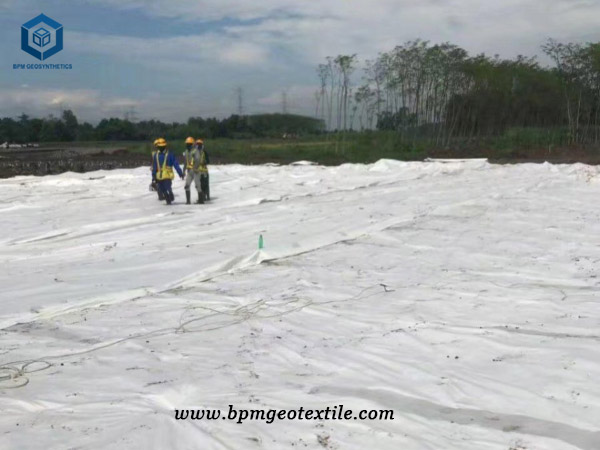
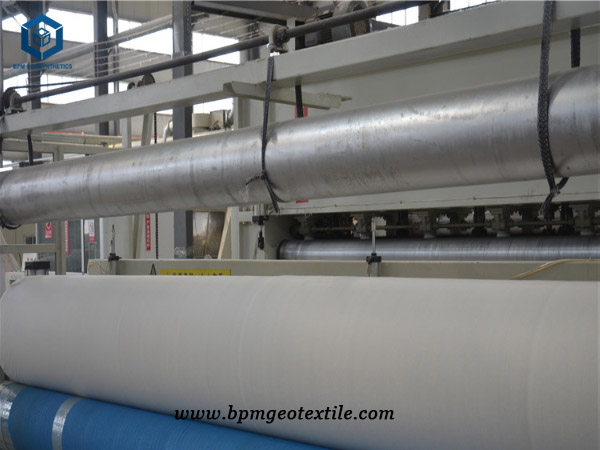
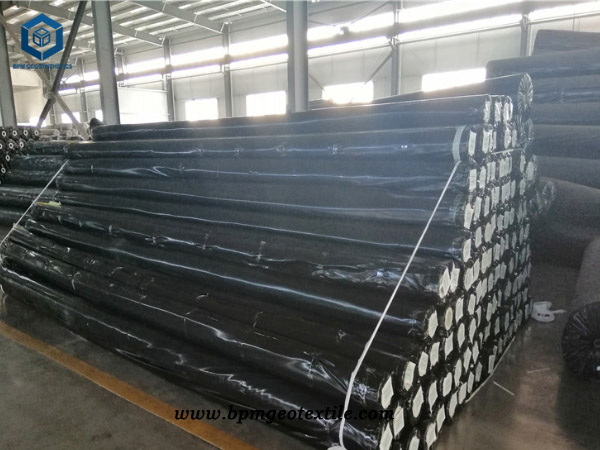
3. Does 100% Polyester Mean Waterproof?
No, 100% polyester does not inherently mean waterproof. Polyester is a synthetic fiber that is not naturally waterproof. However, it can be treated or coated with waterproofing agents or laminates to enhance its water resistance or make it waterproof. These treatments create a barrier on the fabric surface that prevents water from penetrating through.
The level of waterproofing can vary depending on the specific treatment applied to the polyester fabric. Some treated polyester fabrics may be water-resistant, meaning they can repel water to a certain extent but may not withstand heavy or prolonged exposure to moisture. Others may be fully waterproof, capable of preventing water penetration even under significant wet conditions.
4. Is Non Woven Polyester Fabric Waterproof?
Non woven polyester fabric is not inherently waterproof. However, it does have water resistance properties that make it suitable for certain applications where waterproofing and drainage are required. The fabric’s structure and composition create a barrier that slows down the penetration of water, providing a certain level of resistance. However, it is important to note that non woven polyester fabric is not completely impermeable to water and may allow some moisture to pass through under certain conditions. If complete waterproofing is necessary, additional treatments or coatings may be required.
5. Case Study of Non Woven Polyester Fabric for Dam Project in South Africa
In a recent case study, BPM received an inquiry from a customer in South Africa regarding a dam project that required geotextile fabric for slope stabilization. The customer reached out to BPM through their website, and a salesman promptly responded to their request. After reviewing the customer’s drawings and project requirements, BPM recommended non woven polyester fabric with a weight of 200 gsm.
To provide further assurance and transparency, BPM arranged a video tour of their geotextile production shop, showcasing the manufacturing process and quality control measures. The customer was highly satisfied with the virtual tour and expressed confidence in the product.
As a result, the customer decided to purchase 50,000 square meters of non woven polyester fabric for the dam project. Upon receiving the goods, the customer was impressed with the quality of the fabric and its suitability for their application. Consequently, they placed an additional order for another 100,000 square meters.
The specified non woven geotextile fabric had a weight of 200 gsm and was supplied in rolls measuring 6m wide and 100m long. The color of the fabric was white, which met the customer’s requirements.
This successful case study demonstrates BPM’s ability to provide tailored solutions and high-quality non woven polyester fabric for geotextile applications. The customer’s satisfaction and repeat order indicate the reliability and effectiveness of the recommended product in a demanding dam project in South Africa.
6. About BPM Geosynthetics
BPM manufactures and supplies many types of effective and states of the art geotextile, geomembrane, and other geosynthetics to over 81 countries. BPM geosynthetic products are widely used across a variety of industries including waste containment, water containment, aquaculture, industrial project, energy project and mining projects, etc.
Any Questions, please contact us.

